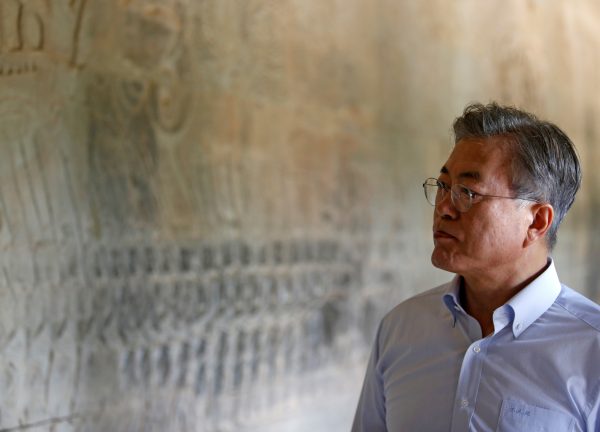Around another 300,000 citizens have signed a separate petition to disband the DP, claiming that it has prompted the current political chaos. They blame the DP for disregarding the LKP when ramming the reform bills through potentially illegal and irregular means, undermining the principle of parliamentary consensus, for its own political interests.
Online petitions are popular in South Korean politics and society, often seen as expressing the public sentiment or ‘popular will’ of Koreans in state affairs. They have proved extremely powerful — even ousting the former president Park Guen-hye in March 2017. The current Moon Jae-in administration is a product of the famous candlelight protests that were largely driven by online activism.
The highly contentious bills call for electoral reform and establishing an independent agency to investigate corruption among high-ranking officials, although excluding President and law makers. They were fast-tracked at the National Assembly on 29 April 2019 despite bitter infighting, including physical scuffles, sit-ins and sleep-ins over four consecutive days. Two other controversial bills on judicial reform, including one to adjust the balance of powers between the police and prosecutors, were also fast-tracked.
The four reform bills serve to change the current electoral system to enable minor parties to gain more parliamentary seats through a new proportional representation system, and to curb the powers of prosecutors who have long been regarded as too powerful. Establishing an independent investigative agency was Moon’s election promise. Fast-tracking these bills ensures they will reach the floor for a general vote without first being blocked by opposing lawmakers (after a maximum of 330 days of review by relevant parliamentary bodies).
LKP argues that the four-party coalition’s move is illegal because they did not give their consent. LKP lawmakers particularly criticise the electoral reform bill which they see as a ploy aimed at ‘extending the life of the current leftist regime’. Concerned by the coalition’s undemocratic approach, even some lawmakers of the ruling party oppose the bill for judicial reform. Kim Young-chun, former Maritime Affairs and Fisheries minister, said in an interview that ‘the bill of electoral reform cannot be processed by fast-tracking’.
The most outspoken critic ironically turns out to be Prosecutor General Moon Moo-il, who claimed the plans went ‘against the democratic principle of checks and balances’.
The fast-tracked reform bills are far from guaranteed to pass parliament, unless something changes in the political thinking of any of the four colluding parties or its members. The centre-right Bareunmirae Party is experiencing severe intra-party conflicts, despite its key role in fast-tracking the contentious bills.
So what are the likely developments emanating from the fast-tracked reform bills and popular online petitions? Three possibilities can be considered.
The first is that President Moon pushes these four contentious reform bills through without any compromise. Moon’s political will over his reform plans is demonstrated in the entire process of the Blue House-led domestic reforms to eradicate ‘accumulated past wrongs’. At a luncheon with elder statesmen on 2 May Moon said, ‘if abuse of powers of the administration for personal gain and abuse of powers in the judiciary are true, they are extremely serious anti-constitutional [crimes], and it is not easy to make a compromise’.
This would most likely lead to a new level of Korean-style ‘imperial presidency’ that Moon had promised to end by changing the Constitution. While constitutional revision is not included in Moon’s reform agenda, he has no reason to restrain his all-out push for the four reform bills in order to protect the interests of his party — not to mention his own government’s political survival — especially in the general elections in April 2020 and the presidential election in March 2022, assuming no change in election law.
The second possibility is the weakening of the role of political parties in the National Assembly, reducing it to either doing nothing or mere rubber stamping. Or alternatively, transforming the National Assembly into a theatre of Korea’s ‘vetocracy’ in which, as Francis Fukuyama noted on American vetocracy, ‘the government has become paralyzed as a result of the ability of well-organized groups to veto initiatives they don’t like’. These developments would not surprise Korean voters because the current parliament has already become highly polarised and dysfunctional, with many corrupt lawmakers doing little other than vetoing.
The third and perhaps most likely possibility is the further development of Korea’s die-hard political culture of candlelight protest politics through means of online activism (such as petitions).
The core problem of this highly intoxicating form of direct democracy, propagated in the name of the ‘popular will’ of the Korean populace, is that it not only reduces the sovereignty of people power instead of protecting it, but also safeguards the culture of authoritarian presidency. This populist-based culture has changed little even under Moon who claims the exclusive moral representation of the Korean people’s ‘candlelight spirit’.
Indeed, it is rare to find similar behaviour in other developed democratic nations.
Where else would millions of people demand the disbandment of a political party or the arrest of certain individuals by signing an online petition on a presidential website? It violates the very democratic principles they claim to stand for.
Dr Hyung-A Kim is an Associate Professor at the School of Culture, History and Language of the College of Asia and the Pacific, the Australian National University.

